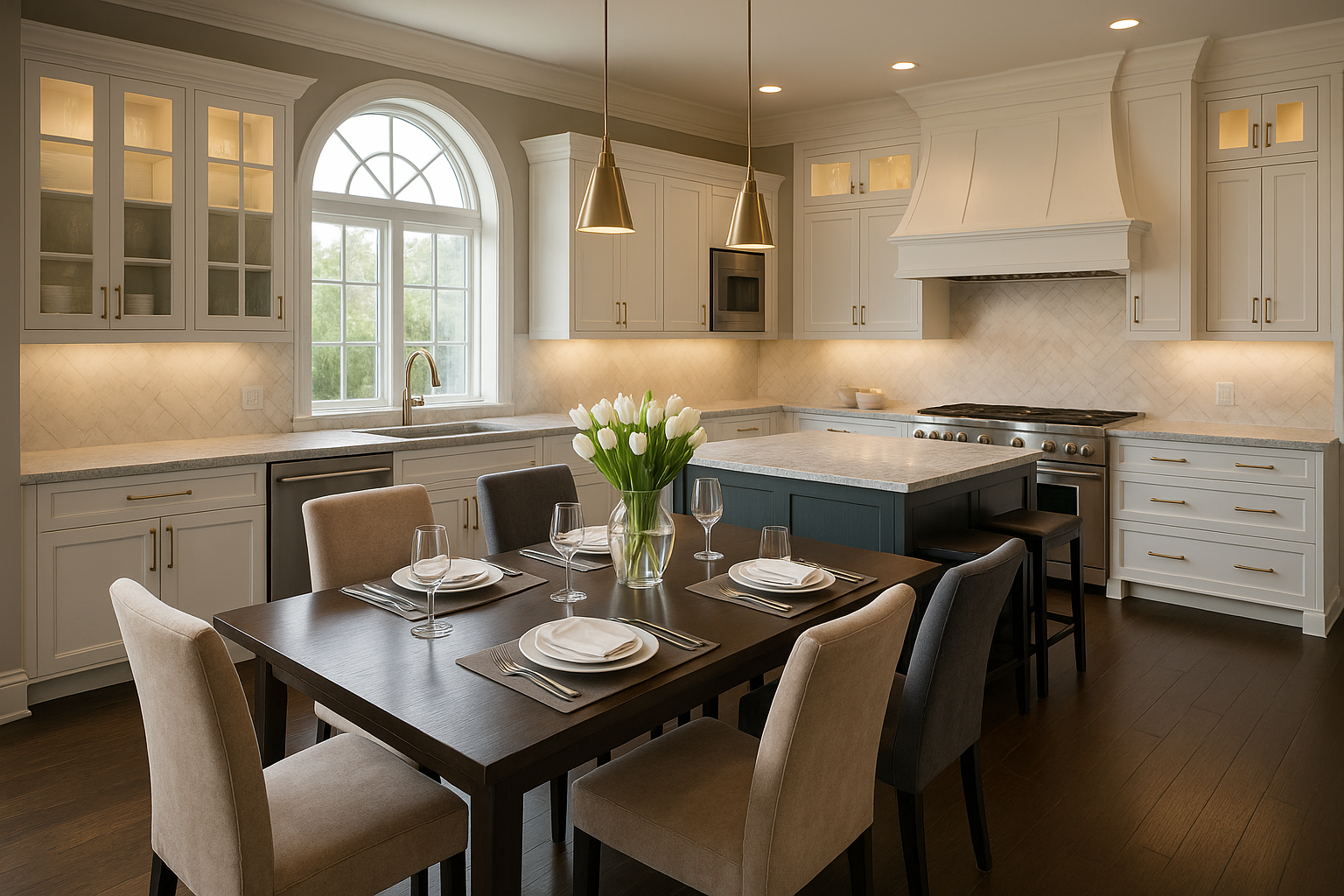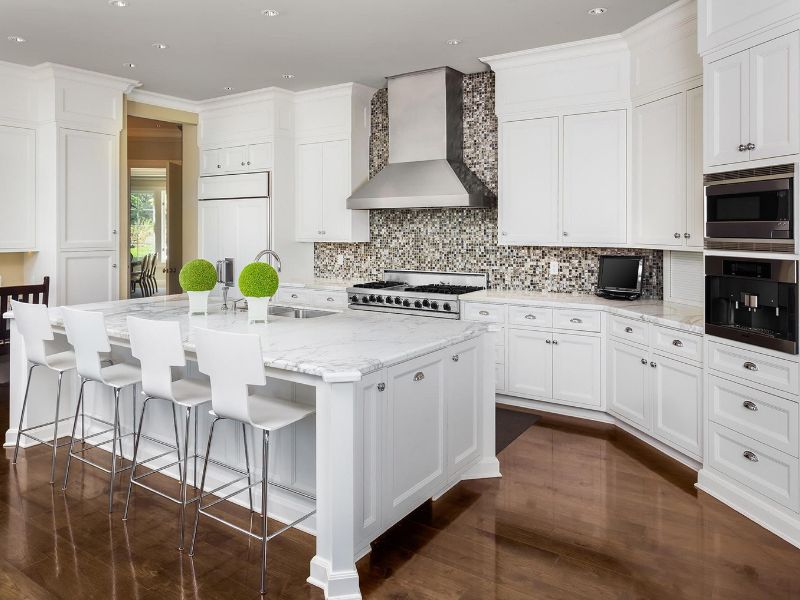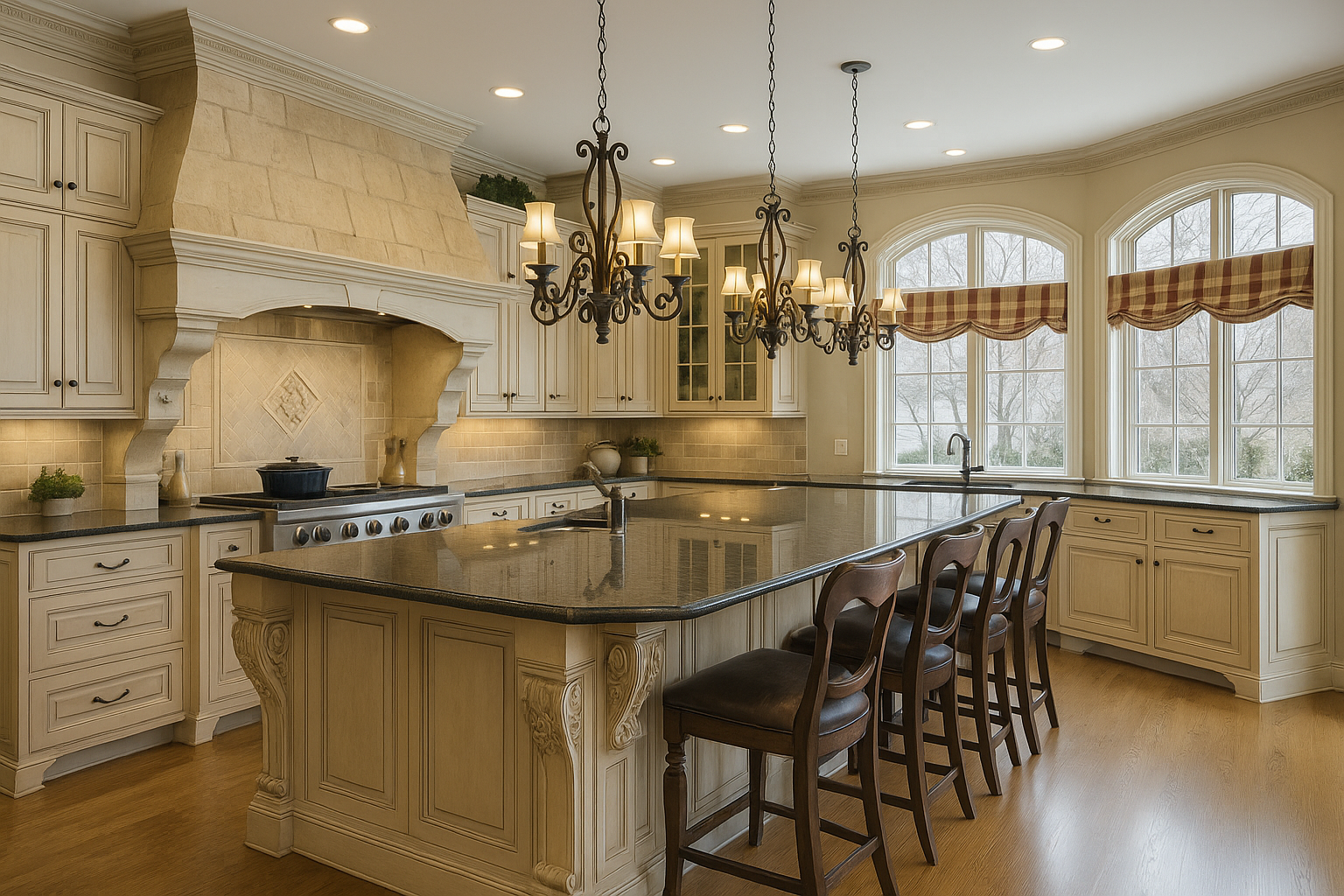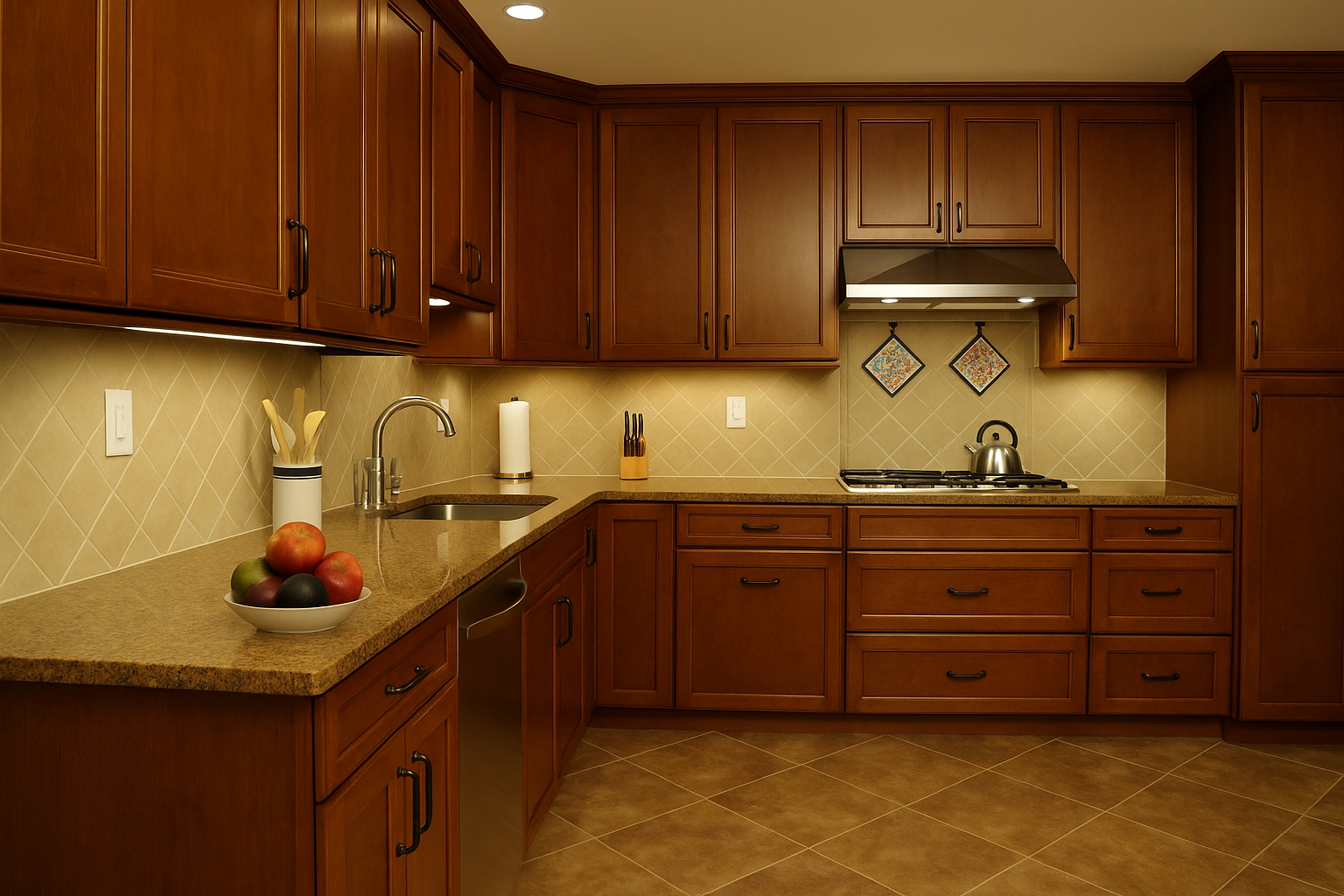Understanding permits and building codes is crucial for a successful kitchen remodel in Tulsa. Learn what's required, how to apply, and ensure your project stays compliant.
Understanding Kitchen Remodeling Permits in Tulsa
Kitchen remodeling permits ensure your renovation meets safety standards and building codes established by the City of Tulsa. While permit requirements might seem burdensome, they protect you, your family, and future homeowners by ensuring work is completed safely and to professional standards.
This comprehensive guide covers everything you need to know about permits and regulations for kitchen remodeling in Tulsa, from determining what requires permits to navigating the application process and ensuring compliance throughout your project.
When Do You Need Permits for Kitchen Remodeling?
Work That Typically Requires Permits
The following kitchen renovation activities generally require permits in Tulsa:
- Electrical work: New circuits, outlets, or major electrical modifications
- Plumbing modifications: Moving or adding water lines, drain lines, or gas lines
- Structural changes: Removing or modifying load-bearing walls
- HVAC modifications: Adding or relocating heating, cooling, or ventilation systems
- Major renovations: Complete kitchen gut and rebuild projects
- Gas appliance installation: New gas lines for ranges, ovens, or other appliances
Work That May Not Require Permits
Some kitchen improvements typically don't require permits:
- Cabinet replacement: Installing new cabinets in same locations
- Countertop installation: Replacing existing countertops
- Flooring replacement: Same-type flooring installation
- Painting and decorating: Cosmetic improvements
- Appliance replacement: Like-for-like appliance swaps using existing connections
Important: Always check with the City of Tulsa for your specific project, as requirements can vary based on scope and location.
Types of Permits for Kitchen Remodeling
Building Permit
Required for structural modifications and major renovations:
- Cost: $50-500+ depending on project value
- Processing time: 5-15 business days
- Required for: Structural changes, additions, major renovations
- Inspections required: Multiple phases throughout construction
Electrical Permit
Required for new electrical work or modifications:
- Cost: $25-200+ depending on scope
- Processing time: 3-10 business days
- Required for: New circuits, outlets, lighting modifications
- Who can apply: Licensed electrician or homeowner (for owner-occupied)
Plumbing Permit
Required for plumbing system modifications:
- Cost: $25-150+ depending on scope
- Processing time: 3-10 business days
- Required for: Moving water lines, drain modifications, gas line work
- Who can apply: Licensed plumber or homeowner (for owner-occupied)
Mechanical Permit
Required for HVAC and ventilation work:
- Cost: $25-150+ depending on scope
- Processing time: 3-10 business days
- Required for: New ventilation systems, HVAC modifications
- Who can apply: Licensed HVAC contractor or homeowner
Tulsa Building Code Requirements
Electrical Code Requirements
Tulsa follows the National Electrical Code (NEC) with local amendments:
- GFCI protection: Required for all kitchen outlets
- Dedicated circuits: 20-amp circuits for kitchen outlets
- Appliance circuits: Dedicated circuits for major appliances
- Lighting circuits: Separate 15 or 20-amp circuits for lighting
- Arc-fault protection: Required for most kitchen circuits
Plumbing Code Requirements
Kitchen plumbing must meet International Plumbing Code standards:
- Water supply: Adequate pressure and flow rates
- Drain sizing: Proper drain pipe sizing for fixtures
- Venting requirements: Adequate drain venting
- Gas line sizing: Proper sizing for gas appliances
- Shut-off valves: Required at appliance connections
Structural Requirements
Structural modifications must comply with building codes:
- Load-bearing analysis: Engineer approval for structural changes
- Beam sizing: Proper support for removed walls
- Foundation requirements: Adequate support for new loads
- Fire safety: Maintain required fire separations
The Permit Application Process
Step 1: Determine Required Permits
- Review your project scope with renovation plans
- Contact Tulsa Development Services for clarification
- Consult with licensed contractors for their input
- Consider hiring professionals to handle permits
Step 2: Prepare Application Materials
Typical requirements include:
- Completed application forms: Available online or at City offices
- Construction drawings: Floor plans, electrical plans, plumbing plans
- Product specifications: Appliance and fixture details
- Structural calculations: If structural work is involved
- Property survey: For some types of work
Step 3: Submit Application and Pay Fees
- Online submission: Available for many permit types
- In-person submission: City Hall or Development Services
- Fee payment: Based on project value and scope
- Review process: Staff review for code compliance
Step 4: Plan Review and Approval
- Initial review: 5-15 business days typically
- Comments and revisions: Address any plan review comments
- Re-submission: If changes are required
- Final approval: Permits issued when plans are approved
Required Inspections
Typical Inspection Schedule
Kitchen remodeling projects typically require these inspections:
Rough-In Inspections
- Electrical rough-in: Before covering wiring with drywall
- Plumbing rough-in: Before covering pipes
- Mechanical rough-in: HVAC work before covering
- Structural rough-in: Framing work if applicable
Final Inspections
- Electrical final: After all electrical work is complete
- Plumbing final: After fixtures are installed
- Mechanical final: After HVAC work is complete
- Building final: Overall project completion
Scheduling Inspections
- 24-hour notice: Minimum notice required for most inspections
- Online scheduling: Available through City website
- Phone scheduling: Call inspection request line
- Morning inspections: Generally scheduled for morning hours
Working with Licensed Contractors
Contractor Licensing Requirements
Tulsa requires proper licensing for trade work:
- General contractors: Oklahoma license required for projects over $50,000
- Electrical contractors: Oklahoma electrical license required
- Plumbing contractors: Oklahoma plumbing license required
- HVAC contractors: Oklahoma mechanical license required
Homeowner Rights and Responsibilities
As a homeowner, you have certain rights and responsibilities:
- Permit ownership: Homeowner is ultimately responsible for permits
- Contractor verification: Verify contractor licenses and insurance
- Inspection access: Provide access for required inspections
- Code compliance: Ensure all work meets current codes
Common Permit Challenges and Solutions
Plan Review Issues
Common problems and how to address them:
- Incomplete drawings: Provide detailed construction documents
- Code violations: Revise plans to meet current codes
- Missing information: Supply all required specifications
- Structural concerns: Provide engineering analysis when needed
Inspection Failures
If inspections fail, address these common issues:
- Code violations: Correct work to meet code requirements
- Safety concerns: Address immediate safety issues
- Installation errors: Fix improper installations
- Missing components: Install all required elements
Special Considerations for Tulsa
Historic Districts
Some Tulsa neighborhoods have additional requirements:
- Historic preservation review: May be required for exterior changes
- Design guidelines: Must comply with district standards
- Material restrictions: Some materials may not be allowed
- Additional approval time: Historic review adds processing time
Homeowners Association Requirements
- HOA approval: May be required before starting work
- Architectural review: Submit plans to HOA committee
- Construction hours: HOA may limit work hours
- Contractor requirements: HOA may have approved contractor lists
Flood Zone Considerations
Some Tulsa areas have flood zone requirements:
- Elevation requirements: Utilities may need to be elevated
- Flood-resistant materials: Required below base flood elevation
- Additional permits: Floodplain development permits may be needed
- Insurance implications: Work may affect flood insurance
Permit Costs and Fees
Typical Fee Structure
Tulsa permit fees are based on project value:
- Base permit fee: Minimum fee for each permit type
- Valuation-based fees: Additional fees based on project cost
- Plan review fees: Separate fees for plan review
- Inspection fees: May include re-inspection fees
Sample Fee Ranges
- Minor electrical work: $25-100
- Kitchen electrical renovation: $75-300
- Plumbing modifications: $50-200
- Complete kitchen renovation: $200-800+
Avoiding Permit Problems
Best Practices
- Apply early: Start permit process before construction begins
- Complete applications: Provide all required information
- Use licensed contractors: Ensure all trade work is properly licensed
- Schedule inspections promptly: Don't delay required inspections
- Address issues quickly: Resolve inspection failures immediately
Common Mistakes to Avoid
- Starting work without permits: Can result in stop-work orders
- Incomplete permit applications: Delays approval process
- Skipping inspections: Creates problems at sale time
- Using unlicensed contractors: Work may not pass inspection
- Ignoring code requirements: Expensive to fix later
After Permit Approval
Maintaining Compliance
- Follow approved plans: Don't deviate without approval
- Schedule inspections on time: Don't proceed without required inspections
- Address inspection comments: Fix issues before requesting re-inspection
- Keep permits visible: Post permits where inspectors can see them
Final Approval and Certificate of Occupancy
- All inspections passed: Complete all required inspections
- Certificate issuance: Receive final approval documentation
- Keep records: Maintain permits and approvals for property records
- Future reference: Documentation needed for future sales or permits
Resources and Contacts
City of Tulsa Contacts
- Development Services: Main permit office
- Building Inspections: Inspection scheduling and questions
- Code Enforcement: Violations and compliance issues
- Planning Department: Zoning and land use questions
Online Resources
- City of Tulsa website: Permit applications and information
- Online permit tracking: Check application status
- Fee calculators: Estimate permit costs
- Code resources: Access to building codes and standards
Working with Shepherd Construction
Our Permit Services
At Shepherd Construction, we handle the permit process for our clients:
- Permit preparation: We prepare and submit all required permits
- Plan preparation: Create construction documents for permit approval
- Code compliance: Ensure all work meets current codes
- Inspection coordination: Schedule and manage all required inspections
- Issue resolution: Address any inspection failures promptly
Why Use Professional Services
- Experience: We know Tulsa's permit process and requirements
- Efficiency: Faster processing with complete, accurate applications
- Compliance: Avoid costly mistakes and code violations
- Peace of mind: Professional handling of all regulatory requirements
Conclusion: Navigating Permits Successfully
While kitchen remodeling permits and regulations might seem complex, they ensure your renovation is safe, compliant, and valuable. Understanding requirements upfront helps avoid delays, extra costs, and potential safety issues.
Working with experienced professionals who understand Tulsa's permit process can save time, money, and stress while ensuring your project meets all regulatory requirements. Don't let permit requirements deter you from your dream kitchen – with proper planning and professional guidance, the process is manageable and protects your investment.
Ready to start your permitted kitchen renovation? Contact Shepherd Construction to discuss your project and let us handle all the permit requirements while you focus on choosing finishes and enjoying the transformation of your space.



